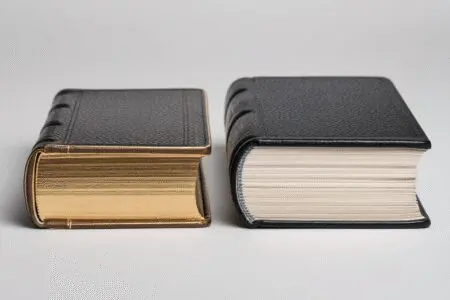Have you ever walked into a Christian bookstore, or even just browsed online, and felt a wave of paralysis? I sure have. You see a wall of Bibles. There are big ones, small ones, some with fancy leather covers, and others that look like textbooks. The sheer number of options can be overwhelming. You genuinely want to dive deeper into God’s Word, but you’re stuck before you even begin, asking a simple question: What is a good study Bible?
It’s a question that doesn’t have a one-size-fits-all answer, but it’s one of the most important questions a growing Christian can ask. A study Bible isn’t just a Bible; it’s a companion, a teacher, and a toolbox all rolled into one. It’s the resource that can help you bridge the gap between ancient texts and your modern life.
Over the years, I’ve used, gifted, and recommended dozens of different study Bibles. This article is the fruit of that experience. It’s not just a list; it’s a guided tour designed to help you find the perfect study Bible for your unique walk with the Lord.
More in Bible Category
What Extra Books Are in the Catholic Bible
What Bible Version Is Best for Kids
What Bible Do Episcopalians Use
Key Takeaways
- Your Goal Matters Most: The “best” study Bible depends entirely on what you want to achieve. Are you looking for practical life application, deep theological understanding, or historical context?
- Translation is Foundational: Before looking at the notes, make sure you’re comfortable with the Bible translation itself (like NIV, ESV, CSB, etc.).
- Features Vary Wildly: Look beyond just the notes. Consider the quality of cross-references, maps, concordances, and articles. These tools can dramatically enhance your study.
- Don’t Be Afraid to “Test Drive”: If possible, look at a physical copy or use online tools like BibleGateway to read a chapter in a version you’re considering. See if the notes and layout connect with you.
- The Best Bible is a Read Bible: Ultimately, the most expensive or feature-packed study Bible is useless if it just sits on your shelf. Choose the one that invites you in and makes you want to read it.
First Things First, What Makes a Study Bible “Good”?
Before we jump into the top 10 list, we need to agree on what we’re looking for. It’s not about a fancy cover or gold-edged pages. A truly good study Bible excels in a few key areas that work together to illuminate the scriptures.
Think of it like a workshop. You need a solid workbench (the biblical text) and the right tools (the study features) to build something meaningful.
How Important is the Bible Translation?
This is absolutely the foundation. The study notes, however brilliant, are commentary on the biblical text itself. You need to choose a translation you trust and enjoy reading. Translations generally fall on a spectrum:
- Word-for-Word (Formal Equivalence): These translations, like the ESV, NASB, and KJV, try to translate the original Hebrew and Greek texts as literally as possible. They are excellent for deep, careful study.
- Thought-for-Thought (Dynamic Equivalence): These translations, like the NIV and NLT, focus on conveying the original meaning and intent of the passage in natural, modern English. They are fantastic for readability and devotional use.
- Balanced: Translations like the CSB aim for a middle ground, blending readability with fidelity to the original words. They call this “Optimal Equivalence.”
There is no “wrong” choice here, only what’s right for you. My advice is to read a familiar passage, like Psalm 23 or John 3:16, in a few different translations to see which one resonates with your heart and mind.
What Kind of Study Notes Should I Look For?
This is the main event! The study notes are what set a study Bible apart. They sit at the bottom of the page or in side columns, offering insights into the text. These notes can:
- Explain difficult verses.
- Provide historical and cultural context.
- Define key theological concepts.
- Show how different parts of the Bible connect.
- Offer points for personal application.
The theological perspective of the editor or team will shape these notes. Some are broadly evangelical, while others come from a specific tradition, like the Reformed faith.
Are There Other Features I Need to Consider?
Yes! A good study Bible is a whole package. Beyond the notes, you should look for a robust set of tools that will help you explore the Word on your own.
- Cross-References: A system that links you to other related verses throughout the Bible. This is one of the most powerful ways to let Scripture interpret Scripture.
- Concordance: An alphabetical index of important words in the Bible and where to find them. It’s incredibly helpful for doing word studies.
- Maps, Charts, and Illustrations: Visual aids are amazing for understanding the world of the Bible. Seeing Paul’s missionary journeys on a map makes the book of Acts come alive in a new way.
- Book Introductions: These introductions provide an overview of each book of the Bible, covering the author, date, themes, and outline. Never skip these!
How Did I Even Begin to Choose These Bibles?
Putting together a “top 10” list is tough. I remember getting my first real study Bible in college. It was a gift, and it completely changed how I read the scriptures. It felt like someone had turned the lights on, and suddenly, connections I had never seen before were sparkling on every page.
That experience started a lifelong passion. This list isn’t just based on sales numbers. It’s a combination of my own personal study, countless conversations with pastors and mentors, and feedback from everyday people in the church who just want to know God better. I aimed for a variety of translations, theological perspectives, and primary goals.
My prayer is that somewhere on this list, you’ll find the companion that helps turn the lights on for you, too.
My Top 10 Study Bible Recommendations for 2025
Alright, let’s get to the main event. Here are my top ten recommendations, each with a unique strength. I’ll break down who each Bible is best for and what makes it special.
1. The ESV Study Bible: Why is this a Theologian’s Favorite?
This one is a powerhouse. If you want a study Bible that feels like you have a seminary professor guiding you, this is it. It’s massive, packed with information, and uncompromising in its depth.
The English Standard Version (ESV) is a word-for-word translation, which makes it a fantastic base for serious study. The notes are comprehensive and come from a team of 95 evangelical scholars and teachers.
What Makes It Stand Out?
- In-Depth Notes: The sheer volume of notes is staggering—over 2 million words of commentary.
- Robust Articles: It includes over 50 articles on topics like biblical theology, ethics, and the history of salvation.
- Stunning Illustrations: The full-color, detailed illustrations and maps are some of the best you’ll find anywhere.
- Trustworthy Scholarship: It’s published by Crossway and has a reputation for academic excellence.
Who is this perfect for? Pastors, seminary students, and anyone who wants to do a deep, theological dive into the text. What’s a potential downside? For a brand-new believer, the sheer amount of information might feel a bit intimidating.
2. The NIV Study Bible, Fully Revised Edition: Is This the Best All-Around Choice?
The NIV has been one of the most popular study Bibles for decades, and for good reason. It strikes a beautiful balance between scholarship and readability. The New International Version (NIV) is a thought-for-thought translation, making it incredibly easy to read and understand.
This new, fully revised edition is a fantastic update. It has fresh notes, beautiful full-color designs, and feels incredibly user-friendly.
What Makes It Stand Out?
- Clarity and Readability: The NIV translation and clear note-writing style make complex ideas accessible.
- Visually Appealing: The modern, full-color layout is engaging and easy to navigate.
- Balanced Approach: It provides great notes on historical context, theology, and application without being overwhelming.
- Updated Scholarship: The notes and articles have been updated to reflect the latest in biblical scholarship.
Who is this perfect for? New believers, small groups, and anyone looking for a reliable, readable, and comprehensive study Bible for daily use.
3. The Life Application Study Bible: How Can the Bible Apply to My Life Today?
This is probably the most popular study Bible in the world, and it earned that spot by answering the question every reader asks: “So what?” It’s laser-focused on helping you apply the Bible’s truths to your everyday life.
It’s available in several translations, including the NLT and NIV, which are perfect for its practical purpose. The notes don’t just explain the text; they build a bridge directly to your career, your relationships, and your personal choices.
What Makes It Stand Out?
- Application-Focused Notes: Nearly every note is geared toward practical, real-world application.
- Character Profiles: In-depth profiles of key biblical figures highlight their strengths, weaknesses, and life lessons.
- Helpful Charts and Maps: Includes maps and charts that clarify timelines and relationships.
- Christian Worker’s Resource: A special section with practical advice on sharing your faith.
Who is this perfect for? Anyone who wants to see how the Bible speaks directly into their daily situations. It’s excellent for both new and seasoned believers who want to live out their faith.
4. The CSB Study Bible: What is the Optimal Balance of Accuracy and Readability?
The Christian Standard Bible (CSB) is a newer translation that has quickly gained a lot of fans. It seeks a middle ground between word-for-word and thought-for-thought translations, calling it “Optimal Equivalence.” The result is a text that is both highly accurate and wonderfully smooth to read.
The CSB Study Bible builds on this foundation with excellent study tools that are both scholarly and accessible. It’s a fantastic modern option that doesn’t compromise on depth.
What Makes It Stand Out?
- Modern, Readable Translation: The CSB is a joy to read, both silently and aloud.
- High-Quality Photos: Includes hundreds of photos of locations and artifacts from the biblical world.
- Greek and Hebrew Word Studies: These highlighted sections provide easy-to-understand insights into the original languages.
- Broadly Evangelical: The notes come from a wide range of respected evangelical scholars.
Who is this perfect for? Anyone who finds the ESV a bit too academic and the NLT a bit too informal. It’s a superb choice for personal study, teaching, and preaching.
5. The MacArthur Study Bible: Do You Want a Pastor’s Guidance on Every Page?
For over 20 years, pastor and teacher John MacArthur has ministered to millions through his detailed, verse-by-verse preaching. This study Bible is the culmination of that lifetime of study. It’s like having a trusted pastor sitting next to you, explaining every passage.
Available in translations like the NASB and ESV, this Bible offers a wealth of commentary from a consistently conservative, evangelical perspective. The notes are extensive and fiercely dedicated to the historical, grammatical interpretation of the text.
What Makes It Stand Out?
- Vast Commentary: Nearly 25,000 explanatory notes that reflect decades of preaching.
- Theological Consistency: Provides a clear, systematic understanding of Scripture from a specific theological viewpoint.
- Detailed Charts and Maps: Over 100 charts, maps, and timelines to help you visualize biblical information.
- Doctrinal Summaries: Includes a comprehensive index of key biblical doctrines.
Who is this perfect for? Those who appreciate John MacArthur’s teaching and want a deep, doctrinally-focused study Bible from a single, trusted voice.
6. The Thompson Chain-Reference Bible: How Can I Trace Themes Throughout Scripture?
This one is unique. It’s less of a “study Bible” in the traditional sense (with notes at the bottom of the page) and more of a “reference Bible.” Its genius lies in its revolutionary reference system that allows you to trace topics and themes through the entire Bible.
Instead of commentary, the margins are filled with numbers. You can follow a chain of numbers from Genesis to Revelation, exploring every major verse related to a topic like “faith,” “mercy,” or “prophecy.” It’s a powerful tool for topical study.
What Makes It Stand Out?
- The Chain-Reference System: Its unique system is unparalleled for topical Bible study.
- Empowers Self-Study: It encourages you to study the Bible itself, rather than relying on commentary.
- Comprehensive Indexes: Contains over 100,000 references organized into more than 8,000 topics.
- Archaeological Supplement: Includes a supplement with information and photos of biblical archaeology.
Who is this perfect for? The student of the Word who wants to do their own topical studies and discover connections for themselves. It’s a great second study Bible to complement one with commentary.
7. The NIV Archaeological Study Bible: What Was the World of the Bible Actually Like?
Does the history and culture behind the Bible fascinate you? This Bible brings the ancient world to life. It’s filled with articles and notes that connect the biblical text to archaeological discoveries.
Reading this feels like taking a tour of a museum with a biblical expert. You’ll see photos of ancient sites, learn about customs that explain confusing passages, and gain a deeper appreciation for the Bible as a real book about real people in real history.
What Makes It Stand Out?
- Archaeological Focus: Over 500 articles on archaeological sites, cultural practices, and historical context.
- Full-Color Photos: Packed with images of artifacts, ruins, and landscapes.
- Detailed Book Introductions: Provides the historical and archaeological setting for each book.
- Trustworthy Sources: The content is carefully researched and presented by experts in the field.
Who is this perfect for? History buffs, apologetics students, and anyone who wants to better understand the historical reliability of the Bible.
8. The Reformation Study Bible: What Are the Core Tenets of Reformed Theology?
Edited by the late, great Dr. R.C. Sproul, this study Bible is a treasure trove for those interested in the Reformed theological tradition. It is deeply rooted in the history and theology of the Protestant Reformation.
Using the ESV translation, the notes explain the text from a perspective that emphasizes the sovereignty of God, the authority of Scripture, and the doctrines of grace.
What Makes It Stand Out?
- Theological Depth: The notes are written by 75 distinguished theologians and pastors from around the world.
- Historical Creeds and Confessions: Includes historic documents like the Apostles’ Creed, the Nicene Creed, and the Westminster Confession.
- Systematic Theology: The notes and articles work together to provide a clear and cohesive theological framework.
- Ligonier Ministries: It’s a flagship resource from a trusted and respected ministry.
Who is this perfect for? Anyone in the Reformed tradition (or those who want to understand it better), including Presbyterians, Reformed Baptists, and others.
9. The NIV Cultural Backgrounds Study Bible: Why Did They Do Things That Way Back Then?
This Bible answers the question, “Why did that seem normal to them?” It goes beyond general history and dives deep into the cultural background of the ancient Near East and the Greco-Roman world. Understanding the culture is often the key that unlocks the meaning of a passage. For more on this, the faculty at Dallas Theological Seminary have some great insights on reading the Bible in its context.
It explains marriage customs, farming practices, social structures, and religious beliefs that the original audience would have taken for granted.
What Makes It Stand Out?
- Expert Commentary: The notes are written by leading experts in ancient world studies.
- Unique Focus: It provides a perspective that most other study Bibles don’t emphasize.
- Fascinating “Sidebars”: The articles are filled with interesting details that make the Bible pop.
- Clarifies Confusing Passages: Many difficult verses become clear when you understand the cultural context.
Who is this perfect for? The curious reader, the serious student, and any teacher who wants to bring the world of the Bible to life for their audience.
10. The Jesus Bible: How Does All of Scripture Point to Christ?
The premise of this Bible is simple but profound. As Jesus himself said on the road to Emmaus, the whole Old Testament is about him. This study Bible is designed to help you see that.
It highlights every passage that points to Jesus, fulfills a prophecy about him, or reflects his character. The notes and articles are written by a fantastic team of authors and pastors like Louie Giglio, Max Lucado, and Randy Alcorn.
What Makes It Stand Out?
- Christ-Centered Focus: Its singular theme makes it a powerful tool for devotional study.
- Accessible Articles: Over 300 articles guide you to see Jesus throughout the biblical narrative.
- Beautiful Design: It is beautifully designed and engaging to read.
- Inspirational Tone: The notes are encouraging and aim to foster a deeper love for Jesus.
Who is this perfect for? Anyone who wants their study to lead to worship. It’s a wonderful devotional Bible that helps you see the grand, unified story of Scripture that culminates in Jesus Christ.
So, How Do I Choose the Right One for Me?
I’ve just given you a lot of information. Feeling a little overwhelmed again? That’s okay. Let’s bring it all home. The perfect study Bible for your friend might not be the perfect one for you. Here’s a simple process to help you decide.
- Ask Yourself: What is My Main Goal Right Now? Be honest. Are you a new believer just trying to get your bearings? Are you in a season where you need practical wisdom for life’s challenges? Or are you ready to dig into some deep theology? Your goal will immediately narrow the list.
- Pick Your Translation First. Go to a site like BibleGateway and read a chapter from Psalms and a chapter from Romans in the ESV, NIV, CSB, and NLT. Which one feels most like “home”? This is a crucial step.
- Review the Top 2-3 Contenders. Based on your goal and translation preference, re-read my descriptions of the 2-3 Bibles that seem like the best fit.
- Pray About It. This is the most important step. Ask the Holy Spirit to guide you to the resource that will best help you know Him more. After all, that’s the whole point.
Ultimately, the best study Bible is the one you will actually open, read, and cherish. The goal isn’t to own a library of fancy books; it’s to have your mind renewed and your life transformed by the living Word of God. Whichever one you choose, may it be a blessing to you for years to come.
Frequently Asked Questions – What Is a Good Study Bible

What is the distinction between the Catholic Study Bible and other study Bibles?
The Catholic Study Bible uses the NABRE version, includes the deuterocanonical books, and features notes from top Catholic scholars, making it specially suited for Catholic readers seeking in-depth biblical understanding from a Catholic perspective.
Which study Bible is best for applying biblical lessons to daily life?
The Life Application Study Bible is designed for practical application, offering notes that focus on how biblical truths relate to everyday life, along with profiles of biblical figures to help teach lessons, and is available in versions like the easy-to-read NLT.
What makes the ESV Study Bible a good choice for deep study?
The ESV Study Bible is highly detailed and respected for its word-for-word accuracy, featuring over 20,000 notes, 200 maps, and 40 pictures, making it especially suitable for pastors, students, or anyone seeking thorough understanding of the biblical texts.
How do I choose the right Bible translation for my study Bible?
Choosing the right translation depends on your purpose; word-for-word translations like ESV, NASB, and KJV are ideal for deep study, thought-for-thought versions like NIV and NLT are easier to read and suitable for general use, and paraphrases like The Message are best for daily reading but not for detailed study.
What are the key features to look for in a good study Bible?
A good study Bible should include features such as study notes that explain difficult verses and key words, book introductions providing context about authors and main ideas, cross-references linking related verses, a concordance for finding verses on specific topics, and maps and charts that illustrate biblical lands and timelines.




